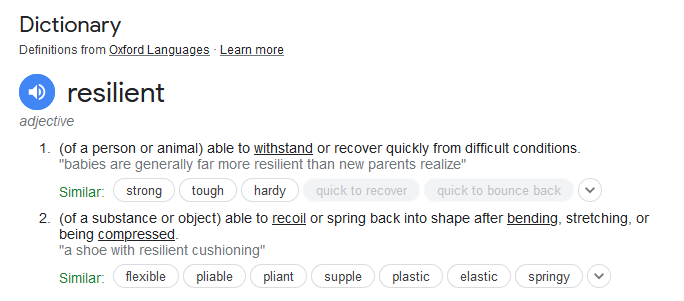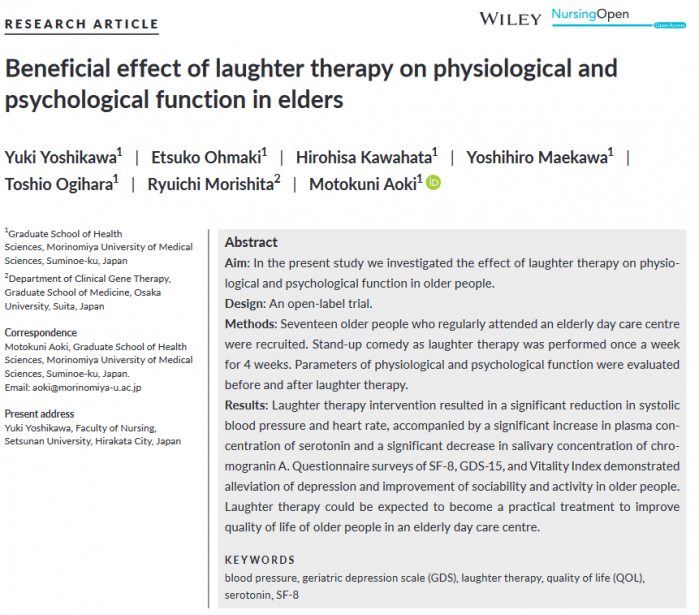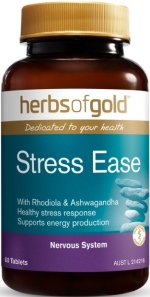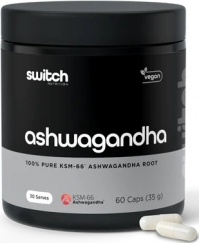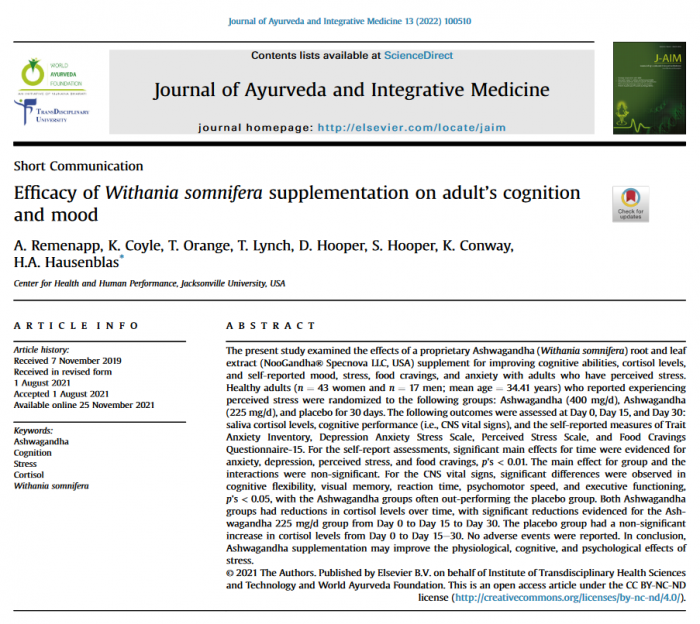Best Anti-Stress Supplements & Habits

In today’s modern fast-paced society, most of us take stress for granted.
No matter how much we dislike it, this nasty little gremlin always manages to work its way into our lives.
And even after so much stressing-out experience, we don't always know what will trigger it, how much stress there will be and how long it will last.
So if we can’t change the fact that another stressful event is just around the corner, its case closed- right?
End of blog?
Well, not quite … there is hope!
There is this concept called mental and emotional resiliency.
At its core, it points to a heightened ability to deal with stressful situations or events.
Here’s the dictionary definition of resilient.
Interestingly, the definition of resilient is applied to an object, like a spring.
Once we bend, stretch or become compressed, the definition indicates we then spring back into shape.
So being resilient isn’t about never being stretched (stressed) out in the first place.
It’s about not getting flattened and being able to recover quickly from a stressful event or situation—or perhaps even an internal sensation or feeling.
This can create quite the mental image of exactly what more resiliency can do for you in your life. 
Less emotional turmoil when faced with an irate person or calamitous situation sounds pretty good right?
Wouldn’t it be just perfect to be less emotional and stay centered and more rational when faced with a crazy situation?
So, is it as easy as taking a supplement and the whole resiliency thing will lock into our lives like a major pay raise?
Of course there are supplements that offer some remarkable benefits.
And if you select the right one that resonates with your biochemistry, you may experience some real benefits.
However, the best approach is always lifestyle interventions in addition to supplementation.
Sure, the truth can be bland and not as exciting as promises that don’t hold up.
But sticking to the untarnished truth, which will provide you with reasonable expectations, and making the most informed decisions regarding your health is an absolute must.
After all, it’s your health and your life.
Why so Serious?
What is this strange noise that emanates from us when we find something humorous?
Maybe it’s something delightfully unexpected that triggers you.
Hopefully it’s not sinister laughter, with plans for global domination.

Or a harsh cackle as you watch someone tumble down some stairs rather than running to their aid.
More so a jolly vocal outbreak that releases your emotional state and doesn’t tread on others in the process.
Our laugh can be as unique as our personality and is a great way to let loose pent up energy that just has to be heard.
Let’s face it, it’s easy to become a serious person, especially when the news is constantly exposing troubling situations from around the globe, without ever examining the positive changes that may also be taking place.
Negative news still seems to trump positive when it comes to click bait and ratings.

Though most of us still feel we need to know what is going on around the world, balancing out the distressing news with some good news may not be such a bad thing.
So how can we laugh with so much injustice in the world?
It’s easy, just open your mouth and go haha!
It turns out, laughter does more than draw attention to our sense of humour.
There are real physiological benefits associated with it.
A study published in 2019 by Nursing Open indicated that laughter may promote sociability and activity in an elderly population.
In addition, mood was boosted, as well as reductions in blood pressure and heart rate.
Another study published back in 2003 indicated that laughter can boost Natural Killer Cell activity.
This is actually an aspect of the immune system that protects against infections and cancer.
The only question that remains, what is there to laugh about?
Should we just force out some mundane chuckles from time to time?
Well, you could try an episode of your favourite sitcom or stand-up comedy from time to time.
Who knows, this just might get your comedic juices flowing so you can take more optimism into your daily activities.
There are no shortage of comedies, with the ever-popular Seinfeld, Parks and Recreations, Friends, Black Books, Ted Lasso and much more. 
Then there are stand-up comedians and specials to check out, such as Chris Rock, Amy Schumer, Eddie Murphy and Jimeon.
Try to look for the little things that happen in everyday life, too.
The small ironies and contradictions that can be so ludicrous as to be humorous.
Like searching the house for your car keys when they’re in your pocket.
No, no … don’t get the wrong idea here. I’m not saying I’ve done this before.
But theoretically, it could happen … right?
It’s just an example, not based on anything in reality—and certainly not drawn from the author’s personal experience …
Learning to laugh at oneself might just be about the best way to break down excessive seriousness towards self.
So get some ice-packs ready, because if you haven’t used them for a while, those cheek and abdominal muscles are going to get sore.
Withania somnifera
This herb goes by many names, though its botanical name is Withania sominfera.
Some just call it Withania, though it may be referred to as Winter Cherry, Indian Ginseng or Ashwagandha.
In herbal medicine, Ashwagandha is referred to as having adaptogenic effects, amongst many other benefits, such as tonic, neuroprotective and immune supportive.
Adaptogenic simply means to support the body in its response to anything that takes it out of homeostasis (balance).
To put it simply, adaptogens promote resiliency in response to stress.
And this stress may be psychological, chemical, environmental and much more.
As far as herbs go, Ashwagandha has perhaps reached the popularity of Echinacea.
There is a steady body of published scientific literature building up, showing just how brilliantly this herbal medicine can promote wellbeing.
One review article specifically examines the neuropsychiatric effects of Withania.
The authors conclude that Withania “ … noteworthy anti-stress and anti-anxiety activity and animal and human studies. WS [Withania somnifera] also improved symptoms of depression and insomnia, though fewer studies investigated these applications.”
A randomized placebo-controlled clinical trial examined the effects of Ashwagandha on mood and cognition.
The researchers found that the herb promoted “ … cognitive flexibility, visual memory, reaction time, psychomotor speed, and executive functioning, p’s <0.05.”
The “p” at the end of that quote indicates the likelihood that the results were due to chance, which in this case is less than 5%, making the study findings significant.
Research also indicates that Ashwagandha promotes sexual well-being and health in women and men, which is not surprising give an established anti-stress and hormonal balancing role.
Whether you’re looking to support sexual well-being, promote psychological resiliency or improve sleeping habits, Ashwagandha is a potent herb offering a range of benefits backed by clinical trials.
Time in Nature
The power of our environment on our health is only beginning to be understood by science.
However, our personal experiences can inform us.
After all, few wouldn’t feel the immediate health impacts of time spent in a rainforest compared to a tech store.
Nature is refreshing and relaxing, whether it is a stroll through a garden, relaxing at the beach or spending time with animals.

It can help us to live in the moment and provide an opportunity to forget our troubles as we simply … let go.
The International Journal of Environmental Research and Public Health published a review article in 2021 with some interesting conclusions.
They found that there were associations between nature exposure, such as “ … improved cognitive function, brain activity, blood pressure, mental health, physical activity, and sleep.”
That’s quite a lot!
In fact, there isn’t much left to positively impact after this.
To be clear, spending time in nature doesn’t have to mean vigorous exercise.
Sure, a run in a park or at the beach can be a lot of fun.

However, time spent relaxing in nature, outside of the framework of physical activity, can be just as important, with its own separate set of benefits.
This way, we are maximising the positive mental and emotional effects.
Relaxing in nature can provide some time to reflect on life and what matters most.
Calming Herbs
In herbal medicine, many herbs are referred to as having sedative properties.
When most of us think of sedatives, we think of barely being able to keep our eyes open and perhaps falling asleep on the spot.
However, these are more akin to the effects of pharmaceutical sedatives.
Herbal sedatives are quite different.

In fact, sedative may not even be the best word to describe their biological effects.
Anti-anxiety and calming is probably a better fit.
For instance, most have heard of a herb called Valeriana officinalis (Valerian).
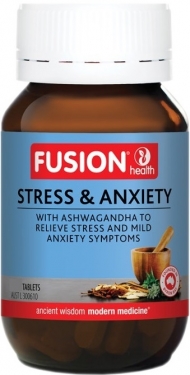 This herb is often used to promote healthy sleep patterns.
This herb is often used to promote healthy sleep patterns.
However, it can be taken during the day to promote emotional wellbeing, especially when someone is experiencing anxiety, over-excitability, stress, irritability and agitation.
There are range of natural formulations designed to assist with the management of stress by promoting calm.
For instance, Bodyscience Calm Stress Support offers Melissa officinalis (Lemon Balm), Kava Kava, Zizyphus and more, with natural anti-anxiety and anti-stress effects.
Fusion Stress and Anxiety delivers Holy Basil and Ashwagandha as powerful adaptogenics, Polygala, Magnolia and more to support you during stressful situations.
Integrating natural supplements that promote calm into your daily supplementation can be a great way to support ongoing wellness, especially while you adopt new anti-stress habits and lifestyle measures.
Sunlight: More than Vitamin D
Given the importance of Vitamin D in maintaining a healthy immune system and protecting against viral infections, few haven’t had a crash course in this nutrient over the past few years.
And of course, a great way to top up your levels of this hormone-like vitamin is through direct sun exposure.
In Australia, we might think that this isn’t something we need to concern ourselves over too much.
This continent is situated relatively close to the equator and so the sun’s rays penetrate the ozone layer at a less oblique angle, ensuring we get plenty of the UVB 290-315 nanometre wavelengths required for Vitamin D synthesis in the skin.
Yet, with decades long indoctrination of slip-slop-slap and skin cancer fear campaigns, many of us have developed an excessive amount of caution and even fear around sun exposure.
Sure, it’s important to be cautious based on logic and facts.
However, fear does create the tendency to become irrational, as we lose our ability to think clearly.
So how common are Vitamin D deficiencies in Australia?
Recent data suggests that nearly 1 in 4 Aussies are Vitamin D deficient.
Another study of Aussie kids showed that 17% of adolescents are 32% of young adults were Vitamin D deficient.
In these studies, they defined deficiency as “serum 25-hydroxyvitamin D concentrations [25(OH)D] < 50 nmol L”

However, higher levels may even be better suited to promoting overall wellness and protection against infectious disease.
So taking in deficiencies and insufficiencies (less than optimal levels) with a higher serum requirement, and the percentage of Australian’s with suboptimal levels would be a lot higher.
If you want to know when a good time is to get out in the sun to produce Vitamin D, the Dminder app is free and designed to do just that.
Vitamin D is well known to impact mood in a positive way, assisting with depression, anxiety and low mood states.
Sunlight has a lot more to offer us than a stimulus for Vitamin D synthesis, however.

At a greater wavelength, sunlight actually delivers near infrared light, which penetrates deep into the human body, even to bone!
This light triggers the production of an important antioxidant inside the mitochondria, the energy powerhouse of the cell.
This specialised form of antioxidant is called melatonin.
Though most of us associate melatonin with night time and sleep, however it does a lot more than this.
This powerful natural chemical is produced locally inside the cell and not released into the body, which would make us sleepy.
Within the cell, Melatonin increases the free-radical fighting power of the cell and assists in keeping us feeling energised and healthy.
Just make sure you are eating enough quality protein to provide an important amino acid called Tryptophan, which is required for melatonin synthesis.
The microbiome within our digestive system also produces melatonin (and tryptophan), so be sure to keep your gut health as a top priority with plenty of cultured foods and an organic diet to minimise chemical (especially glyphosate) exposure.
A Farmer from Epsom
Magnesium Sulphate, also known as Epsom Salts, was the first discovered form of magnesium back in 1618.
A farmer from Epsom in the UK noticed that his cows wouldn’t drink from a particular well due to the bitter taste of the water.
It was soon identified to contain high level of magnesium sulphate, called Epsom Salts.
Magnesium supplements have been on the health supplementation market for many decades now and is taken for a range of reasons, from poor sleep to muscle cramps.

Involved in over three-hundred enzyme reactions in the human body, magnesium is one of the most important nutrients for human health.
The Australian Bureau of Statistics showed that for the period 2011-2012 a little over one-third of Australians do not consume enough magnesium through regular diet.
This can be backed up with a paper published twenty years earlier showing that in Australia, 50% of men and 39% of women consume less than the recommended daily intake.
This is to be taken with a grain of salt, however, as the most accurate measure of magnesium status is intracellular testing.
The most common test, which is serum, as well as dietary estimates, are much less accurate and sensitive than a red cell magnesium test.
Based on this information, it is fair to say that magnesium is one of the many nutrients in which deficiencies (and insufficiencies) are common.
So what does this mean in terms of daily psychological stress tolerance?
Plenty.
Magnesium supplementation has been shown to improve sleep quality, perhaps by promoting pineal gland melatonin synthesis and functioning as a GABA agonist and NMDA antagonist in the brain.
Another study showed that in anxiety-prone people, magnesium supplementation was able to reduce anxiety levels.
To quote Magnesium in the Central Nervous System by Vink R and Cuciureanu M.D., “Magnesium status is highly associated with stress levels, with both stress and hypomagnesemia potentiating each other’s negative effects.”
Essentially, if you have less magnesium you are more prone to stress.
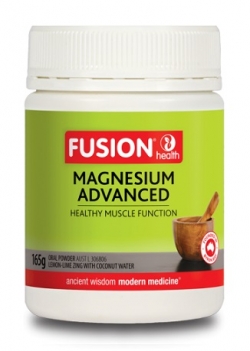 If you are stressed you are more likely to be magnesium depleted.
If you are stressed you are more likely to be magnesium depleted.
And the vicious cycle continues …
Here enters a diet high in magnesium rich foods as well as a premium bioavailable magnesium supplement!
Food sources rich in magnesium are: Nuts & Seeds, Green Leafy Vegetables, Avocado, Banana and Dark Chocolate.
Though transdermal creams and baths are popular approaches to magnesium, research is yet to confirm just how much reaches the blood stream compared to oral supplementation.
Though those promoting magnesium creams are often quick to dismiss the effectiveness of oral supplements, the fact remains that there are high bioavailability magnesium forms (chelate, citrate, malate, glycinate) and low types (oxide, sulphate, carbonate).

Creative Immersion
Engaging in a create pursuit can be an immersive process that swallows up the world around you.
If you fully give yourself into the practice, all sense of future and past can temporarily fall away.
Some like to call this living in the present moment.
Call it what you will, the fact remains that a complete expression of our highest creativity may mutually excludes stress.
The two seem to go together like oil and water: the stress gets pushed away while we dive into a pool of focus and imagination.
There are plenty of possibilities if you want to engage in a creative activity.
Some like to cook and experiment with flavours and textures, while others enjoy creating an ornament or furnishing out of wood.
Painting or sketching is a practice that can be enjoyed out of the house, perhaps while experiencing nature.

Other creative pursuits could be re-designing a room in the house, singing or playing an instrument or dancing.
A Behavioural Sciences review paper published in 2018 indicated that of the 37 studies, 81% of them showed that art modalities significantly reduced stress.
The art modalities they referred to in this study are art, music, dance/movement and drama therapy.
However, the proof is in the pudding.
Not literally—this is not a licence to consume large amounts of pudding.
However, if you have a little creative side and are looking for something anti-stress to help keep you calm in your spare time, why not let loose, do something out-of-the-box and immerse yourself fully in a creative hobby?
Wrapping it all Up
Reducing your stress level in life isn’t about avoiding anything that could remotely lead to a stressful experience.
Psychological stress is a part of human nature, driven up by the complexities of living in modern society with technology.
We can however, modulate how we feel during a stressful event, with effort over time.
The sheer quantity of options available when it comes to anti-stress habits is only limited by your imagination.
You might find that one tactic resonates with you more than another.
So take your time in considering the feasibility of each habit and the likelihood of it becoming something you can integrate into your lifestyle and enjoy long term.
There are plenty of healthy supplement options available to assist in this process, delivering key herbal medicines, vitamins, minerals and other nutraceuticals.
It is important to mention also that a complete inability to cope during stressful situations may indicate that you have low cortisol levels or that you need the assistance of a competent counsellor or psychologist for assistance.
And remember, the fundamentals of health are quality sleep, exercise, relaxation practices (mediation, prayer, yoga), a healthy diet (without overeating) and limiting EMF and toxin exposure.
Without these foundational aspects of health in place, trying to make improvements in any single aspect of human health will be an uphill battle.
The fact remains, however, there is always something positive to do that will make a positive impact on our lives.



